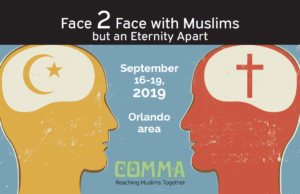By Nabeel T. Jabbour
Roy Oksnevad wrote an insightful article on the topic “Which Lenses Do You Use?” Roy concluded his article with this statement: “The particular lens you chose will color the way you see, react, and witness to Muslims.”

In his article he presented a set of lenses which could “be helpful in evaluating books, websites, articles, and speakers on Islam.” He explained each lens and illustrated them with well-known names in the Christian West. https://commanetwork.com/dig_deeper/which-lens-do-you-use/
Here are the lenses:
- Anthropological
- Emic Lens: People with this approach “describe the religion as members of the religion would describe it.”
- Etic Lens: People with this approach tend to be missiologists and anthropologists. They attempt to understand “the people and religion in greater context.”
- Religious
- Islamophobic Lens: People with the Islamophobic approach tend to “stereotype Islam as violent and the only true authentic expression of Islam.”
- Polemic Lens: People with the polemic approach present a “contentious argument that is intended to support a specific position via attacks on a contrary position.”
- Apologetics Lens: This lens uses the “discipline of defending a position and explaining one’s beliefs through systematic use of information or proof.”
- Theological Lens: People who use the theological approach focus on “systematic theology as the lens for judging the truthfulness of religion from a Christian perspective.”
- Missiological Lens: People who use the missiological approach rely on “practical theology that investigates the mandate, message, and mission of the Christian church to reach Muslims for Christ.”
- Irenic Lens: People who use the irenic approach focus on making peace and building bridges through round-table discussions.
I was asked to address the topic of “Viewing Islam through Muslims’ Eyes.” Which Muslims are we talking about? Are we talking about the Muslim Fundamentalists, the cultural Muslims, the Qur’anic Muslims, the Muslim atheists, the Sufis, the secular, the ambivalent Muslim, or those who adhere to folk Islam?
In my presentation I would like to use the phenomenological approach by truly listening to Muslims. I will introduce you to a couple of fictional people from an Egyptian family who are composites of many Muslims I have known over the years in Lebanon and in Egypt. Those two individuals represent the worldview of educated open-minded Muslims who have deep roots into their Islamic culture, religion, and society.
In Islam there is no separation between religion and state. For them Islam is a religion and a state (Deen wa Dawla). When we look at Islam what do we see? Islam is like a rope with five main strands: 1) Muslims are people and we are commanded to love them. 2) Islam is a theology that we need to understand in a scholarly manner. 3) Islam is a culture. 4) Islam is a worldview. 5) Islam contains an evil structure of power that we need to understand, identify, and to learn to confront it in an appropriate manner. Because the rope contains an evil structure of power, we tend to have mixed feelings about Islam and Muslims.
A huge debate is taking place in the world today at every level, among Muslims, among politicians, among missiologists and missionaries, and among Christians all over the world.
Some people believe that Islam/Qur’an has no problem and Islam is a religion of peace. Both Presidents George W. Bush and Barak Obama said that Islam is a religion of peace. They have to say that because America includes Muslim citizens.
Others in that big debate believe that Islam/Qur’an has a problem. What is that problem? Still others in that big debate believe that Islam/Qur’an is the problem. I personally believe that it all boils down to the theory of abrogation and how we and Muslims deal with it.
Where do we stand in that debate?
Some of us tend to look at Islam as a religion that has a core set of beliefs that differs from all other major religions. Islam is seen as monolithic, with a prevailing interpretation of core doctrine that defines the worldview of all Muslims.
Others of us look at Islam as containing a conglomeration of diverse communities, defined more by traditions, history, and customs rather than a singular stated core theology. Most Muslims are born into Islam and that is why they see themselves as Muslims.
Through two fictional characters, an Egyptian international student who came to America for his PhD and his father who is a semi-retired physician in Egypt, I would like to give you a sample of the worldview of open-minded, educated Muslims who are deeply grounded in their Muslim culture and are passionate about justice. Their Islam includes theology, politics, economics, culture, customs, traditions, and a society that offers them a place of belongingness. Those two fictional characters are composites of real people I have known over the years.
Here is an opportunity for us at COMMA to have two Muslim guest speakers coming to the COMMA consultation 2019 to present to us their worldview and to describe the lenses through which they look at American Evangelicals and America’s role in the Muslim world in general and in the Middle East in particular.
The 2019 COMMA Consultation takes place September 16-19, 2019 in Orlando, FL. Click here for details and to register.